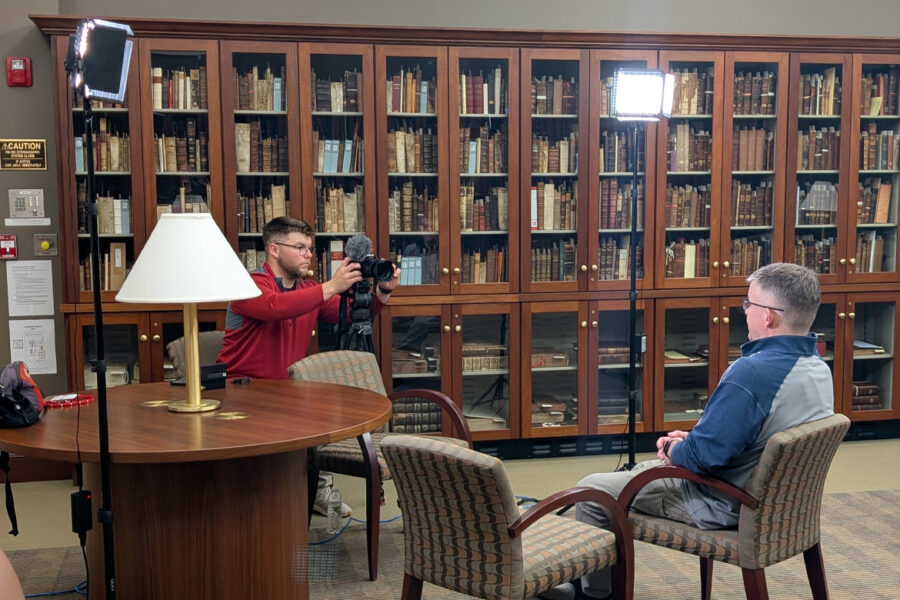Blog author
Grace Spaulding, Student Worker
Many UNMC students, faculty, staff and alumni, along with Nebraska Medicine colleagues, have filed into the Level 8 south rare book room of the library to share their stories for the oral history program. With the intention of preserving their lived experience for researchers now and in the future, this program will only continue to expand. The oral history program documents the experiences and achievements of UNMC administrators, faculty, staff, and students from the 1920s to the present day based on the narrators’ personal remembrances.
Before the programs reconstruction in 2018, there were two existing collections within the library’s archives focusing on recollections from 100th anniversary celebration and alumni experiences. This inherited program and its collection have since been integrated into the current comprehensive collection.
Best said by Associate Dean of Special Collections Archives, Carrie Meyer, and Digital Archivist, Larissa Krayer, “The UNMC Oral History Program strives to capture the history of UNMC and the university’s impact on health care. Currently the archive consists of over 200 interviews about university history, including narratives of students, alumni, faculty, and staff.”
Carrie and Larissa added that, “Interviews are also collected in accordance with ongoing library strategic initiatives, including but not limited to projects related to engagement and belonging; bio preparedness; and student organizations.”
About the Collection
Collecting narratives from a diverse group of individuals at UNMC and Nebraska Medicine paints a whole and complex picture of the institutions past, present and future, serving as a resource for students, faculty, staff, as well as researchers everywhere. This collective historical narrative is valuable for the continued development of understanding of UNMC and their goals, as well as recognizing the people who have made this place revolutionary.
The collection showcases diverse and unique voices in UNMC and Nebraska Medicine that make it a place for people to learn and thrive. Additionally, it showcases not only the community in Omaha, but also the 500-mile campus as a whole, ensuring that rural health initiatives are also allowed their moment to shine, as that is a key focus of the University of Nebraska Medical Center. The intentional integration of stories from the developing Kearney campus is a great example of this initiative.
By incorporating interviews with people from multiple different positions within the six colleges and adjacent institutes, the library is empowered to focus on gathering underrepresented voices, in addition to those who are more well known. Engaging in the sharing of these oral histories has created a space in which history can be shared from the perspective of the person who has lived it. This includes remembrances of mentorships and those who have been impactful for the careers of the narrators, personal projects and passions, as well as a deeper understanding of motivations and unknown personal anecdotes. Hearing accounts from a person who knows the history of their area of expertise is incredibly beneficial for all research and educational endeavors.
Integration within the Wigton Heritage Center
An additional aspect of the program is the connection to the Wigton Heritage Center’s exhibits. By integrating the accounts of people who have been part of the history of the university and the medical center, there is an added layer of culture and context within the exhibits. Not only does this make the subject matter more accessible via the online database, it also connects people to real-life figures who are part of making history every day.
Ongoing Work
The oral history program team of twelve individuals is continuing to work with a wide span of individuals to better represent the entirety of UNMC and Nebraska Medicine, as well as provide new and exciting insight into the work done by the institution.
